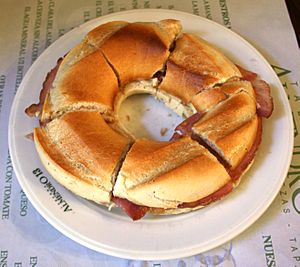Rosca facts for kids

Rosca from Madrid, Spain
|
|
| Alternative names | Ka'ake |
|---|---|
| Type | Bread, bagel, doughnut |
| Region or state | Mexico, South America, and other areas |
| Created by | Spanish and Portuguese |
| Main ingredients | Flour, salt, sugar, butter, yeast, water, and seasonings |
Rosca is a special type of bread that looks like a ring or a bagel. It comes from Spain and Portugal, but it's also very popular in places like Mexico and South America. People make rosca using simple ingredients such as flour, salt, sugar, butter, yeast, and water. Sometimes, they add different seasonings to give it a unique taste. Another name for rosca is ka'ake, and some people call it a "Syrian-style cracker ring."
Contents
Discovering Rosca de Reyes
One of the most famous types of rosca is called Roscas de Reyes. This name means "ring of kings" or "Three Kings' bread." People eat this special bread on January 6th, a day known as "El Día de Los Reyes" (The Day of the Kings). This day celebrates the story of the Three Kings who visited baby Jesus and brought him gifts like gold, myrrh, and frankincense.
What Makes Rosca de Reyes Special?
Roscas de Reyes is a large, round cake that is often decorated with colorful candied fruits. These fruits make the cake look very festive and appealing. Depending on the recipe, bakers might also add ingredients like raisins, milk, anise, cinnamon, or vanilla to give it a delicious flavor.
The Hidden Surprise Inside
A fun tradition with Roscas de Reyes is that a tiny plastic figure of the baby Jesus is hidden inside the cake. When people share the cake, everyone hopes to find the little figure in their slice!
The person who finds the first plastic baby is considered very lucky. In many families, this person has to host a dinner party on February 2nd. This day is called "Dia de la Virgen de la Candelaria" (Day of the Virgin of Candelaria). If someone else finds another plastic baby in their slice, they usually bring a dish to the dinner party.
After eating the rosca, children sometimes leave their shoes near the door. This is part of the tradition, as they might receive a small gift!
Gallery
-
Roscas "chonchinas" from Chonchi (Chiloé, Chile)
-
A painting from 1770 by Luis Egidio Meléndez showing roscas





